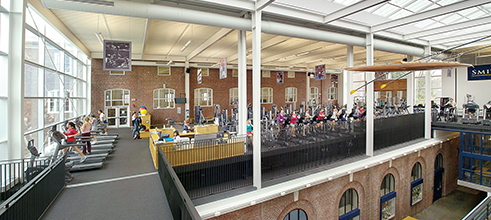Document Type
Article
Publication Date
1-1-2010
Publication Title
Clinical Science
Abstract
Exercise may contribute to the maintenance of vascular function via enhanced liberation and action of bone-marrow-derived progenitor cells. Activity related changes in oxidative stress may also influence the number and function of these cells. In the present study, we sought to determine (i) whether adaptations in reactive hyperaemic FBF (forearm blood flow) response associated with long-term endurance exercise and short-term detraining were related to resting putative progenitor cell number and function, and (ii) whether oxidative stress affected these factors. Participants included men with a history of more than 30 years of moderate-to-high-intensity exercise (HI group) and healthy low-active age- and BMI (body mass index)-matched control subjects (LO group). Vascular reactive hyperaemic FBF response, resting CD34+ and CD34+/VEGFR2+ (vascular endothelial growth factor receptor 2+] cell number, CFU-EC (colony-forming unit-endothelial cell) count and CFU-EC senescence were evaluated. Oxidative stress measures included OxLDL (oxidized low-density lipoprotein) and TAC (total antioxidant capacity). These measures were assessed following 10 days of detraining in the HI group. The HI group had greater peak reactive hyperaemic FBF responses compared with the LO group, despite no difference in resting CD34+ cell number, CD34+/VEGFR2+ cell number, CFU-EC colonies or CFU-EC senescence. With detraining in the HI group, CD34+ cells declined 44 %, and the percentage change in CD34+/VEGFR2+ cells was positively correlated with the change in FBF response to reactive hyperaemia. The percentage change in CD34+/VEGFR2+ cells and the percentage change in EPC (endothelial progenitor cell) senescence with detraining were related to the percentage change in TAC. These results reveal that changes in reactive hyperaemic FBF are closely related to activity dependent dynamic changes in CD34+/VEGFR2+ cell number, which may be influenced by alterations in oxidative stress.
Keywords
Aging, Antioxidant, Endothelial progenitor cell, Exercise, Forearm blood flow, Physical inactivity
Volume
118
Issue
4
First Page
303
Last Page
311
DOI
10.1042/CS20090253
ISSN
01435221
Rights
© The Authors
Version
Author's Accepted Manuscript
Recommended Citation
Witkowski, Sarah; Lockard, Michael M.; Jenkins, Nathan T.; Obisesan, Thomas O.; Spangenburg, Espen E.; and Hagberg, James M., "Relationship Between Circulating Progenitor Cells, Vascular Function and Oxidative Stress with Long-Term Training and Short-Term Detraining in Older Men" (2010). Exercise and Sport Studies: Faculty Publications, Smith College, Northampton, MA.
https://scholarworks.smith.edu/ess_facpubs/24


